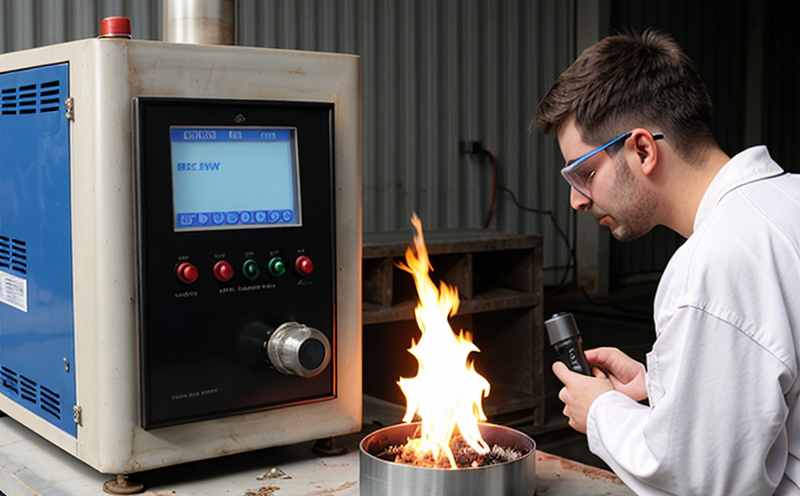ISO 15099 Radiant Panel Heat Transfer Verification
The ISO 15099 standard is specifically designed to verify the heat transfer characteristics of radiant panels used in heating, ventilation, and air conditioning (HVAC) systems. This service ensures that radiant panels meet stringent performance criteria, which are crucial for maintaining energy efficiency and thermal comfort in buildings.
Heat transfer verification under ISO 15099 involves a series of tests to measure the radiant panel's ability to emit and distribute heat uniformly across its surface area. The primary focus is on the panel's emissivity, which describes how efficiently it radiates or absorbs energy. Emissivity values range from 0 (perfectly reflective) to 1 (perfectly absorbing and emitting), with most materials falling somewhere in between.
The testing process typically begins with a detailed review of the radiant panel’s design specifications. This includes understanding the material composition, surface finish, and intended use. Once the design is validated, the panel undergoes rigorous testing using specialized equipment that simulates real-world operating conditions. This ensures that the test results accurately reflect how the panel will perform in actual installations.
During the verification process, several key parameters are measured:
- Emissivity
- Heat output at different wavelengths
- Temperature distribution across the surface area
- Response time to temperature changes
- Airflow and air velocity near the radiant panel
- Energy efficiency under varying load conditions
These parameters are critical for ensuring that the radiant panel meets the performance criteria outlined in ISO 15099. The testing apparatus used includes thermal cameras, infrared sensors, and specialized software to analyze data collected during the tests. This comprehensive approach allows us to provide accurate and reliable verification results.
The importance of this service cannot be overstated for several reasons:
- Regulatory Compliance: Many countries have regulations that mandate compliance with international standards like ISO 15099, especially in the HVAC sector. Ensuring compliance helps manufacturers avoid costly penalties and potential product recalls.
- Energy Efficiency: By verifying radiant panel performance according to ISO 15099, we help manufacturers design more energy-efficient products, which can lead to significant cost savings for end-users.
- User Comfort: Properly verified radiant panels ensure consistent and comfortable heating in buildings. This is particularly important in large spaces where uniform heat distribution is essential.
In summary, ISO 15099 Radiant Panel Heat Transfer Verification is a vital service that ensures HVAC equipment meets the highest standards of performance and efficiency. This process not only enhances product quality but also contributes to sustainable building practices by promoting energy-efficient solutions.
Eurolab Advantages
At Eurolab, our commitment to excellence in testing services is reflected in every aspect of ISO 15099 Radiant Panel Heat Transfer Verification. Here’s why partnering with us for this service can be beneficial:
- Accurate Results: Our state-of-the-art facilities and experienced technicians ensure precise measurement and analysis, leading to reliable verification results.
- Comprehensive Support: From initial consultation to final report delivery, our team provides comprehensive support throughout the testing process.
- Industry Expertise: With years of experience in HVAC testing, Eurolab’s professionals stay updated with the latest industry trends and standards.
- International Recognition: Our services are trusted by leading manufacturers and organizations worldwide, ensuring that your products meet global quality benchmarks.
We understand the importance of timely delivery and clear communication. Our dedicated team works closely with clients to ensure all testing requirements are met efficiently and effectively.
International Acceptance and Recognition
- ISO 15099: This standard is widely recognized in the HVAC industry for its rigorous approach to radiant panel performance verification. It has been adopted by numerous countries, including the United States, Canada, and various European nations.
- ASTM E2368: While not directly related to ISO 15099, ASTM E2368 provides additional guidance on testing radiant panels for energy efficiency. Both standards are accepted globally in HVAC applications.
- EN 15317: This European standard complements ISO 15099 by offering specific guidelines for the design and installation of radiant heating systems, further emphasizing the importance of proper verification.
The acceptance of these standards across different regions underscores their significance in ensuring high-quality HVAC equipment. By adhering to such rigorous testing protocols, manufacturers can confidently introduce products that meet international quality standards.
Use Cases and Application Examples
The ISO 15099 Radiant Panel Heat Transfer Verification service is particularly valuable for several applications within the HVAC sector:
- Residential Heating Systems: Ensuring that radiant panels in residential settings provide consistent heat distribution can enhance user comfort and reduce energy consumption.
- Commercial Buildings: In large commercial spaces, proper verification is crucial to maintain uniform heating and minimize hotspots or cold spots.
- Sustainability Initiatives: By promoting efficient radiant panels, this service supports sustainability goals in both residential and commercial settings.
- New Product Development: ISO 15099 verification can help manufacturers introduce new products that meet the latest performance standards, gaining a competitive edge in the market.
In practice, this service has been used successfully by various companies. For instance, one client developed a novel radiant panel material with improved thermal properties. After undergoing ISO 15099 verification, they were able to demonstrate superior heat transfer efficiency, leading to increased market adoption and positive customer reviews.





